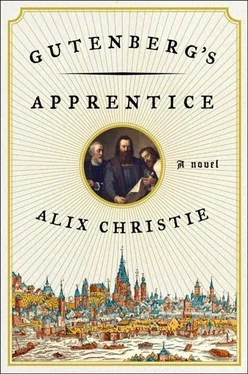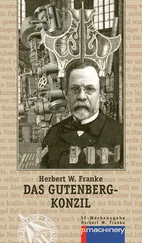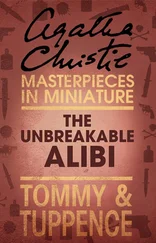“The page is laid according to the golden section.” The words that Peter said were meant to reassure. The black quill in the man’s cap dipped abruptly. “The edge is like a razor,” he said, the feather wagging like a finger as he frowned and shook his head.
All morning Gutenberg had simply batted off their queries, saying, “It’s a gift from God, just like this earth — and who among you dares to ask Him how He made it?” The secret of the new technique was bound by oath, as ever — if anything, it should be held more secret now. Peter answered the man evasively: “The lines line up remarkably, indeed.”
The scribe peered at him, troubled, and Peter saw a mirror of his own soul. How close he might have come himself to joining that great scribal brotherhood. He thought of Paris and the abbey, and the sacred calling to which he too once felt summoned. But for his father, and for Gutenberg, he would be standing now where this man stood.
A Spanish priest slipped in beside the monk and started fingering the quires. Once, then twice, he asked in his accented Latin what this miracle might be. Gutenberg smiled, saying, “You use the word, not me!” He asked where the priest was from. Granada, said the priest, though now he served his cardinal in Rome. Gutenberg was merry as he glanced at Peter. “By all means tell him of this miracle you’ve seen,” he said and briefly bowed. Before he could say more, a local priest had shouldered in, repugnance staining his broad cheeks.
“Miracle,” he sneered. “Blasphemy, I think you mean.”
“There is no blasphemy in faithful copies of God’s Word.” Dismissively, the master turned.
“By devil’s means? For only devilry could make this thing.” The priest leaned, a black streak against the table.
A muttering began among the folk who pressed in from the back, confusion moving from one face into the next; on others Peter saw a growing fear.
“There is no feeling in it,” said the Brother of the Quill. “No spirit.”
“A godless simulacrum.” The priest’s pale face was streaked with red; his hands were lifted as if warding off some evil seeping from the quires. “Who granted you this dispensation?”
The master drew to his full height. “Who granted it, you ask?” His eyes swept through the crowd. “The very Highest!” His voice was booming as his arms rose up and grasped the air and shook it as he doubtless wished to shake that priest’s thick neck. “It has been granted by a God you cannot understand or see, if you doubt this. Just look, if anyone among you has got eyes — it is a miracle, a gift divine!” He dropped his hoary head down within inches of the priest. “Just look, instead of clutching at your rosary!”
Peter stepped in before the master could make things worse. “Each copy is the same — and freer than the scribe’s from error.” He put a little pressure in the hand he laid on Gutenberg’s left arm. “The pope has called for this repeatedly, as you well know.” He caught the Spaniard’s eye. “The meaning cannot slip from text to text — and praise the Lord, the Word can spread the faster in this way.” The Spanish priest looked back down at their Bible, open-lipped; his soul quite palpably was stirred.
Gutenberg leaned his whole weight upon his hands. Steady, Peter prayed: defend — do not offend. “Blasphemy.” He let the word out like a bitter trickle from his lips. “The only blasphemy consists in spurning what God in His wisdom has decreed.” He reached and hefted up one volume of that massive and amazing book. “See here! What God has given us, to share His Word across the world! A new technique, a miracle, that we in Mainz have birthed!”
He glanced at Peter. Then he winked. Peter had to turn away to hide his smile.
Gutenberg set down the Bible, flapped his arms to thin the crowd. “Time’s a-wasting,” he sang out. “If you’re not buying, get a move on. I have books to sell!” He flipped one volume open to Proverbs. “Step up! Step up!” he cried, “and touch the miracle from Mainz!”
A trader out of Kraków took him up at once. A paper copy, sir, to pledge to the Franciscans for his dear departed wife’s eternal soul. And then another, from the Alpen lands. The master grinned and rubbed his hands. Peter took deposits, noting down each name and terms. “You should have seen the man,” he would tell Anna later. Gutenberg had never been a trader, yet the whirl of all that selling did intoxicate him, plainly. His hair was wild again, rayed out in all directions. He took the sheets and rubbed them on the gray weave of his tunic, proving that the ink remained in place. He grinned and hooted, purred, cajoled. From time to time he turned and mopped his brow and squeezed Peter’s arm. “Blind me!” he said when they had sold off twenty in three hours. Elated, he embraced his foreman on both cheeks and then turned back, shouting hoarsely to the waiting crowd. He was a trickster and a showman, a performer, Peter thought: his gift lay just as much in coaxing coins from purses as in dreaming up his new machines. You never got the one without the other, he had always said.
At noontime Peter ventured from the bookstalls to see how Johann Fust was getting on. He let the human river carry him uphill, past the stink of fish and oil and resin into the bitter tang of hides and doggy mustiness of unspun wool. He rounded weighing scales just shy of the cathedral: bright slabs of brass slumped to the ground, chains lax; beside them lay great piles of hemp and flax. On the stairs of St. Bartholomew’s a priest stood sweating, swinging a small metal box. His other hand held Gutenberg’s indulgences. “Forgiveness from the pope, and blessings for the afterlife,” Peter heard him nasally intone. He laughed a little to himself and shook his head. They’d made it, despite everything, he thought.
He wedged his way into the dense throng on the square that moved in all directions like a shoal of salmon flinging their fat bodies upstream. Not since Paris had he seen such masses of humanity. Here were outlandish hats on traders out of Lodz and Prague, there the northern accents of the Hanseatic merchants, bartering their herring and their furs. The gentry in their velvets and their jewels moved in clots protected by their valets, color high, eyes bright, fingering the leather harnesses and silks. The abbots and the masters of the sacred and the secular estates all bought their woolens and their metals and their raw materials here, and could be seen in their dark robes conferring. Peter passed a stand of arctic fox and sables and thought instantly of Anna. What choice! What vast arrays of sumptuous goods he might in these two weeks be tempted into buying! Emporium of wonders, fair of fairs, the greatest show and circus in the world! Entertainers drew their knots of gawkers, spitting fire and eating swords, and he had even heard that there were beasts from Asia held in cages by St. Catherine’s door.
Beneath the Römer’s arches he found Jakob and his foreman in a vaulted space so glittering it hurt his eyes. All of Bohemia, it seemed, had set up shop with their glass beads; the colors bounced, refracting blindingly off gold and silver from the smiths of Mainz and elsewhere in the empire.
“How goes it?” he asked. Jakob only grunted. “Too soon to say.” His uncle put his mouth to Peter’s ear. “Though I hear you have made a splash.”
Peter smiled. “It’s going well.”
“You’d better pray.”
Peter rolled his eyes and pulled his tunic open to reveal the coins wrapped tight against his waist. Though most goods sold on credit, they’d asked five guilders on deposit for each book. His uncle opened up the safe.
“What plans tonight?” asked Peter when the gold was stowed. He had a mind to see the whole of it, from gaming house to drinking ship, and not with Gutenberg or Fust.
Читать дальше












